-
ONE NIGHT ひとよ (Shiraishi Kazuya 2019)
SHIRAISHI KAZUYUA: ONE NIGHTひとよ(2019)
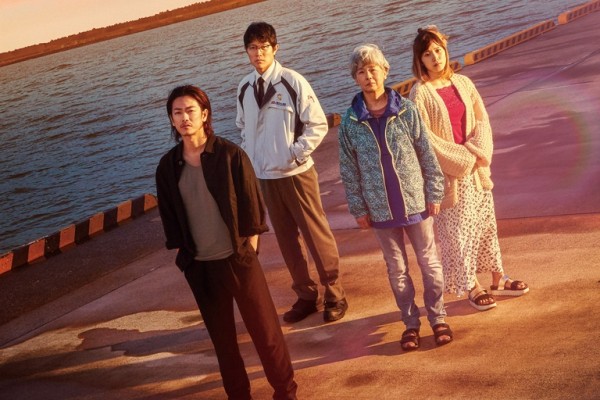
TAKERU SATOH, RYOHEI SUZUKI, YUKO TANAKA AND MAYU MATSUOKA IN ONE NIGHT
Family dynamic not improved by spousal murder
Ths screenplay of One Night was written by Shiraishi’s collaborator Takahashi Izumi and based on a 2011 play by Kuwabara Yuko. Shiraishi's a bit of a NYAFF bad boy (we know him from The Blood of Wolves and Dare to Stop Us), and here returns with a multilayered meditation on the stigma of violence. This time he focuses on a family.
The film opens with a flashback to a stormy night when Koharu (Yuko Tanaka) returns home, in mannish taxi driver garb, to inform the three children that to eliminate the family's pain and suffering she has murdered their violent, abusive father by running over him with her taxi. She will turn herself in now, and will go to jail, but they are free. She promises to come back in a decade - no, make that fifteen years - to rejoin them. Meanwhile they will be safe and can pursue their lives unimpeded.
Well, Koharu has made a brave sacrifice, but of course she's left her two sons and daughter to grow up without a mother and father and in the shadow of yet another trauma. It turns out that in the absence of the parents their mother's family runs the provincial taxi company and takes care of the kids. But in the wake of the ugly physical abuse of the murdered father (of which we get a hideous glimpse) and the outsider status bestowed upon them by having a murderer for a mother, the three kids aren't exactly what you'd call lucky, or the town's favorite young people.
We quickly jump forward fifteen years, when Kooharu appears, looking totally gray and surprisingly neat and respectable. It seems she has spent several years since her release working at different jobs elsewhere but they haven't been in touch. She hesitated to come back, she says, but she has kept her promise. She had reason to hesitate.
Now we meet the three offspring as they are now. Yuji (Takeru Satoh), the talented, smart one, has a dashing, saturnine appearance and a chip on his shoulder and is cultivating literary fantasies while actually working for a porn mag in Tokyo - where a scene shows his lowly status. He's come back back home to the provinces now for the first time in a while to meet mom, but he's the least happy with her return, or with anything. He's meanwhile gathering data on the family scandals and horrors for a planned novel, taking constant snapshots of the family scene with his smartphone as part of the preparation. As for the tall, still stuttering Daiki (Ryohei Suzuki), he is in a foundering marriage to a wife whose family business he's been working at, though the wife wants to divorce him and leave, taking their little girl with them. A brief scene fills us in on that.
Most positive - she insists their mother did save them from a much worse life - is the daughter, Sonoko (Mayu Matsuoka),a pretty young woman who dreamed of being a hairdresser, and was a hostess at a snack bar, but lately, as she tells Yuji, focuses on being a call girl, an "escort," if you like, while getting drunk every night at a karaoke bar.
Koharu's brother's family, who've been running the taxi company successfully, seem more happy to see her. We meet some of them. Yumi (Mariko Tsutsui) is having an affair while caring for her senile mother-in-law. Michio/Doushita (Kuranosuke Sasaki) is a new driver. He arrives around the same time that Koharu does, looking a bit the worse for wear but mercurial and all smiles. He doesn't drink, do drugs, or gamble, which got him hired right away. But following scenes where he's reunited with his teenage son after a long separation and encounters an unwelcome former colleague, it emerges that he has a problematic past of his own that he's trying to escape from.
Whatever the family or taxi firm employees may think or however well they get along with Koharu, the locals of this provincial town quickly grow hostile to Koraru's return when they hear of it: her presence, seen from a slight distance but still too close for them, is a scandal. Local news has reported on it and little flyers multiply around the taxi company broadcasting that there's a murderess, a husband-killer, in town. The siblings hasten to clean up the company vehicles that they awaken to find covered in abusive white graffiti. If this film is good at anything, it's mess: cluttered, disorganized rooms, littered spaces, graffiti-covered walls and vehicles are, perversely, a delight to the eye. Sometimes the Japanese seem to be reacting to the design austerity of their traditional culture, the empty tatami-spread rooms, the rolled-away futons. Of the graffiti-decorated cars, Yuji takes snapshots with his phone, but promises his saying it's to show Koharu is only a joke.
Koharu's return is a classic gesture for a play. It causes all the old traumas to come back to mind. Realized cinematically it also brings about a lot of things - like the abusive fliers and graffiti. Perhaps the cathartic reconciliation wold work better on the stage. But what Shiraishi can provide that a playwright can't is another big storm outside.
James Hadfield of The Japan Times, who calls this "the most conventional thing [Shiraishi has] done to date," sees this a treatment of themes Kazuya cares about: "whether the ends ever justify the means, and if there’s any hope for people who commit awful deeds. He thinks that some of the early scenes show "taut execution" but finds the climax to be "a disappointing mess." An Italian critic (the film debuted at Udine) calls it "hasty" and says that's the "only fault." Well, the finale is busy. Some of the physical clutter that provides the film with its pleasingly icky contemporary texture may seem to pour over into overelaborate action. But nonetheless those final minutes are cathartic. There's nothing like family for drama.
One NIght ひとよ (Shiraishi Kazuya 2019), 123 mins., debuted Oct. 2019 at Tokyo, showing Nov. 2019 at Taipei, and included in the online Jun.-Jul.2020 Udine Festival. It was screened for this review as part of the virtual 2020 New York Asian Film Festival (Aug. 28-Sept. 12, 2020).
Last edited by Chris Knipp; 08-29-2020 at 10:41 PM.
-
MIYAMOTO 宮本から君へ (Mariko Tetsuya 2019)
MARIKO TETSUYA: MIYAMOTO 宮本から君へ (2019)

SOSUKE IKEMATSU, LEFT, IN MIYAMOTO
Enthusiastic salaryman
Early this year the Harvard Library's film collection featured a series on Mariko Tetsuya called "Self Destruction Cinema" and that may be the best place to begin in describing the latest of his two more high-profile films (he has been active as a writer and maker of movies and TV mini-series since 2003). The previous film is called Destruction Babies (and that's the title, transliterated in Japanese characters, Disutorakushon beibîzu) and features someone more sadistic and more masochistic than young Hiroshi Miyamoto. (The full title this time is From Miyamoto to You and there was a miniseries, with the same actors and director, based on the manga series "Miyamoto kara Kimi e" by Hideki Arai.) Sôsuke Ikematsu plays the role in both and he owns the role; there are several other actors from the miniseries also here. Ikematsu is awesome as the baby-faced young salaryman who goes for broke in feelings and commitment, no reserves, no good sense, no physical fear.
Cinema of extremes, also. Miyamoto is some kind of madcap hero, but no role model. He takes it on himself to rid a pretty young woman, Yasuko (Yû Aoi) of an unwanted ex-boyfriend. Then she takes to him and they have sex and get involved. Next thing you know, he's meeting her parents, the Nakano family, who own a company. The mother loves that he drinks like a fish. (In some parts of Japanese society it's considered a good social trait to be able to drink a lot.) There is a sequence of extreme beer drinking. Miyamoto drinks so much he later passes out in a comatose sleep while with Yasuko. A member of the Nakano family is a ruby player and has giant bruiser-type rugby player friends. One of them comes and rapes Yasuko, right in front of Miyamoto, stretched out sleeping like a baby. He's so out Yasuko's screams never wake him. The rape is the hardest of a series of violent, hard-to-watch sequences in this movie of gonzo interpersonal violence and scream-fests that sometimes seem grating and at others, purgative.
When Miyamoto finds out what has happened to his girlfriend (he has to guess, which makes the sequence more painful), he becomes determined to take revenge against the giant rugby player rapist. He is also more than ever determined to marry Yasuko. Only what has happened has made Yasuko unable not to loathe him. She called on him for help again and again and he did not budge. Her revulsion will change, somewhat inexplicably. The storytelling provides no clear logical explanation of Yasuko's change of feelings toward Miyamoto.
In many scenes Miyamoto is missing three front teeth, because in his first of several violent encounters with the rapist, he gets a giant fist in the mouth ("like a bowling ball," he recounts afterward) and loses them Later he gets more damaged, but in a final encounter between the two high up on an apartment building balcony, Miyamoto manages to reverse roles by doing damage where it hurts most and capitalizing on the advantage inflicting excruciating pain gives him over his huge adversary.
The dialogue is at two levels in this movie, low and high, with nothing in between. People are either talking calmly, under their breath (with some voice-over narration) or, when it gets intense, shouting at the top of their voices, possibly spouting blood or foaming at the mouth as they do so. Particularly memorable in this vein is a scene where Miyamoto comes to propose marriage at the top of his lungs to Yasuko in the middle of her place of work. There is scattered applause, but Yasuko screams back in front of everybody her absolute refusal and desire never to set eyes on Miyamoto again.
Everyone (in the English language comments I've found) talks about how cringe-inducing and hard to watch a lof ot the action is in this movie. Japanese fans of the mang seem to have been delighted by the film. "You are in a comic book world," one says, and that sums it up. The Japanese are not as offended by or judgmental about fictional violence or extremes as Americans are. Even if you're shocked, this is also compulsive watching, except for the rape, when I wanted to look away. This is not a Cinema of Cruelty a la Antonin Artaud or spatter action a la Grand Guignol. Many blockbuster action of thriller films have more violence, cruelty, and blood. Here, it's mitigated by Miyamoto's good-heartedness and sincerity. His courage is foolhardy, but his determination and loyalty are worthy of the tales of courtly love. In its warped, hysterical way, Miyamoto is a rom-com. Wait for the Judd Apatow-produced Hollywood remake.
Miyamoto 宮本から君へ, 129 mins., opened in Japan Sept. 2019 and Hong Kong Nov., 2019; featured at Chicago Oct. 2019. Screened for this review as part of the virtual 2020 New York Asian Film Festival.
Last edited by Chris Knipp; 08-29-2020 at 02:26 PM.
-
BEASTS CLAWING AT STRAWS 지푸라기라도 잡고 싶은 짐승들 (Kim Yong-hoon 2020)
KIM YONG-HOON: BEASTS CLAWING AT STRAWS 지푸라기라도 잡고 싶은 짐승들 (2020)
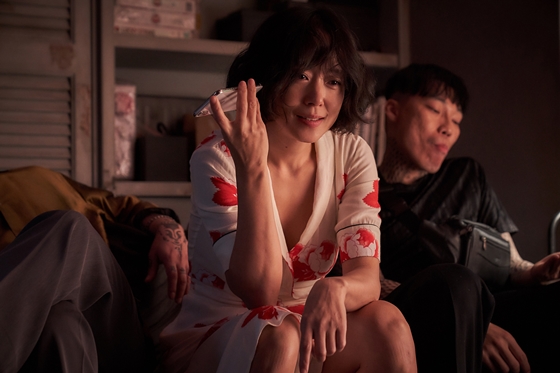
A pleasing genre debut surrounding a bag of money
The bodies really mount and a fancy bag gets shifted around in this engaging, if occasionally a little opaque multi-segmented tale of people scrambling for money. It starts with a cheap hotel with sauna in Pyeongtaek, a northwest port city in South Korea, where the action transpires (and there's some good seafood). In the prologue, down-on-his luck employee at this joint Jung-man (Bae Sung-woo) finds a big Louis Vuitton satchel (presumably a real one, to honor the contents) that somebody left in a locker, heavy with maybe a million bucks in Korean money. He stuffs it away in a back storage room to retrieve later, as it turns out, after getting fired for not being punctual at work. In what follows the shifted-around sequences show us what happened before this event - and after it.
Jung-man and wife work at lowly jobs due to heir small business going belly-up, and live with his aggressive, difficult mom with dementia (Yun Yuh-jung). As stylish if not particularly helpful story segments unreel ("Debt," "Bait,", "Food Chain," "Shark," "Luck Strike" [sic], "Money bag"), over time we meet hip madam Yeon-hee (Jeon Do-yeon) and her spousally-abused top call girl Mi-ran (Shin Hyun-been), who needs to get rid of her husband and also (Yeon-hee does) owes a lot of money from losing stock market investments loaned to her by her boyfriend, whom we'll also be meeting. Jin-Tae (Jung Ga-Ram), a cute but goofy young Chinese illegal with processed orange hair , volunteers to do the husband disposal, having fallen for Mi-ran, by faking a car accident. Then he can go back to China with her.
With some fanfare there arrives the madam Yeon-hee's boyfriend, who's a customs agent Tae-young (Jung Woo-sung), who gets hounded by loan shark Mr. Park (Jung Man-sik) and Park's cannibalistic enforcer (Bae Jin-woong). There's a nosy, self-indulgent cop, a nasty hotel manager, a high school classmate of Tae-young's coming around to bother people, and other creditable actors.
Most of these projects go badly wrong, and hence the growing body count.
Debuting filmmaker Kim Yong-hoon, as a generous [Korean Herald article reported, is a late-bloomer long toiling in a media corporation, is working zestfully from an adaptation of Japanese writer Keisuke Sone's novel. There are influences and Kim acknowledges Fargo. US reviewers have mentioned What's Up Doc? (with more blood) as well as Pulp Fiction meets No Country for Old Men "one could charitably say," says Neil Young in his Hollywood Reporter Rotterdam review.
Well, those are two of my favorite Tarantino and Coen brothers movies, and we shouldn't expect that level of intensity. But we can enjoy the glossy gangster movie style, nice lighting and cinematography (there's a swell fire, and lots of night-time neon panorama, doubtless enhanced by first-time director Kim Yon-hoon's beginner's enthusiasm. Most of all there are watchable actors, headed by Jung Woo-sung (The Good, the Bad, and the Weird) and Jeon Do-yeon, who won the Best Actress award at Cannes in 2007 for her lead performance in Lee Chang-dong's Secret Sunshine (NYFF 2007). At the end, I wanted more - but nowadays, that's a good thing. We can well hope for other explorations of the wealth of genre possibilities and the Korean flair for gangster violence from Kim Yong-hoon.
The Variety critic said all the genre tics might have made this deserve retitling as "Beasts Clawing at Cliches" "if it weren’t such an amusing, echt Korean romp." But it is, and we had fun.
Beasts Clawing at Straws 지푸라기라도 잡고 싶은 짐승들, 108 mins., debuted at Rotterdam Jan. 2020, winning the jury award there, and opened theatrically in South Korean in Feb. 2020. It has played in France, with a premiere in Paris Jun. 22, 2020 and theatrical release in Paris Jul. 8 (AlloCiné press rating 3.6: Nouvel Observateur "un polar amphétaminé"; limited release July 30, Singapore. Screened for this review as part of the virtual 2020 NYAFF.
Last edited by Chris Knipp; 08-31-2020 at 10:09 PM.
-
A WITNESS OUT OF THE BLUE 犯罪現場 (Andrew Fung 2019)
ANDREW FUNG: A WITNESS OUT OF THE BLUE (2019)
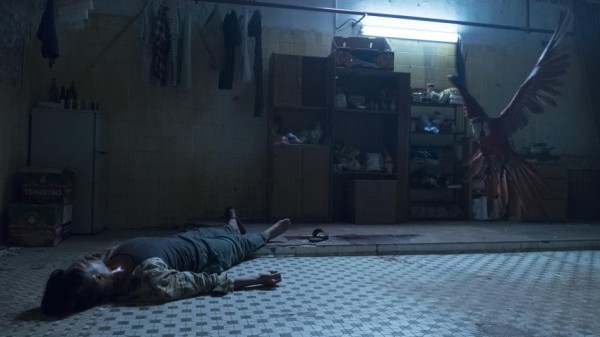
AVIAN WITNESS TO A MURDER IN A WITNESS OUT OF THE BLUE
An attractive criminal and a red parrot
In this classy, if conventional, new Chinese polar noir, we follow the cops and the crooks with equal sympathy. Particularly we follow career heist specialist Sean Wong (Louis Koo), who currently holes up in a rooming house where where the other lodgers are on the old side (one lady is 95, another 100) and the pretty landlady (Jessica Hester Hsuan), smitten, like us, plies him with special soups and meds. She has a hidden weakness. The cops are less attractive. Three months ago there was a jewelry heist (led by Sean Wong) which left several people dead, but has left few clues. Now, Homer Tsui (Deep Ng), one of Wong's confederates, has been found murdered in the industrial building where the loot was kept. The only witness is a magnificent scarlet red parrot, which has been trained to talk.
In one scene, Detective Lam (Louis Cheung), who's keeping the parrot just in case, dreams it can speak in sentences like a human. He wakes up with a shock and tells the parrot about his dream, and says, "I wonder what I'm like in your dreams." He need not wonder what his colleagues think of his keeping the parrot and hoping for clues from it. Not much. He's a bit of a bumbler. As for the parrot, its Cantonese is poor. But Lam says Cantonese is just too hard a language to teach a parrot. They should have chosen English or French, relatively simple tongues.
Nice details like this are worthy of Andrew Fung (Fung Chih-chiang), a screenwriter of films such as Stephen Chow's Shaolin Soccer and Johnnie To's Sparrow. This is the fourth of his features as a writer-director, which are in a variety of genres. It's not a high-powered, big budget Hong Kong dazzler. TheScreen Anarchy writer Ard Vijn says it's not to be remembered "for its action scenes, plot twists, or outrageous style." Really? Well, aybe not. But it's a nicely crafted procedural with fine moments of character and mood, the parrot, and an ending that seemed twisty enough to me.
Wong is playing detective too, because the jewelry has disappeared, while his heist team members are getting polished off one by one by a mysterious killer. He wants to prove that killer is not him. This whole setup for Louis Ko and the charisma bestowed upon him remind one somewhat of Alain Delon in Jean-Pierre Melville's Le Samourai. Edmund Lee calls the character "an amoral enigma" in his South China Morning Post review. He may have musings and misgivings, but he's also capabel of pulling out a long gun and mowing down people. He's got an arsenal in a satchel at the rooming house.
Another officer dies, Inspector Yip (Philip Keung), who had suspected Wong of killing Homer Tsui. As the thieves are knocked off one by one, Inspector Lam and his colleague Charmaine (Cherry Ngan Cheuk-ling) now suspect Yip. It's the old good Hong Kong movie thing of cop double-crosses and suspicions. Another officer accuses Lam of having it in for Yip and protecting Wong, and Internal Affairs comes in to relieve Lam of his badge and gun. Of course that doesn't stop him. Before it's over, all riddles will be solved and needed organs donated. Too tidy? Hey, Forget it Jake, it's Hong Kong.
A Witness Out of the Blue 犯罪現場 ("Scene of the Crime"), 104 mins., debuted a and opened Hong Kong Asian Film Festival and opened in China and Hong Kong in Oct. 2019, Nov. 2019 in Taiwan. It was screened for this review as part of the Aug. 28-Sept 12, 2020 virtual NYAFF.
Last edited by Chris Knipp; 08-31-2020 at 04:12 PM.
-
MOVING ON On 남매의 여름밤 (Yoon Dan-bi 2019)
YOON DAN-BI: MOVING ON On 남매의 여름밤 (2019)
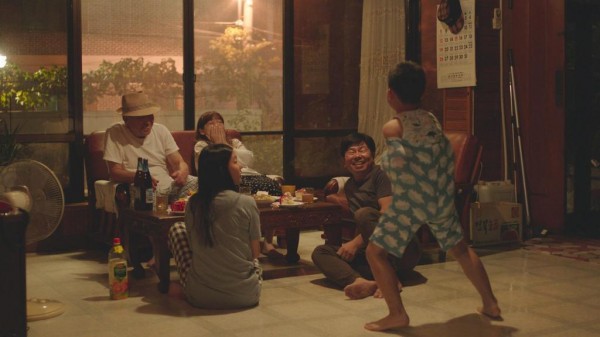
PARK SEUNG-JOON (AS DONGJU) ENTERTAINS THE GROUP WITH HIS IMPROVISATIONAL DANCING
A slice of fragmented Korean family life, in transition
In Yoon’s gentle family drama, a newly divorced man, Lee Byunggi (Yang Heung-joo) moves into his aging, widowed father Lee Youngmuk's house with his 18-year-old daughter Okju (Choi Jung-woon) and tween son Dongju (Park Seung-Joon), and shortly afterward, their Aunt Mijung joins them, escaping a broken marriage. It's a steamy summer. We join them all for a while.
Everybody is good humored and good at coping. Okju and Donju squabble, but it doesn't get nasty till it emerges that Donju is loyal to their mother, and Okju refuses contact with her. Grandpa is initially in the hospital from heat stroke and when he's back, doesn't say much, but he seems not to feel imposed upon. They give him a birthday party after Aunt Mijung comes, which he seems to enjoy. Mijung sleeps in the same bedroom with Okju at her invitation which she, perhaps understandably, refused to allow Dongju to occupy, while Dad, Grandpa, and Dongju sleep in the other bedroom.
Michael Rosser's Rotterdam interview with Yoon Dan-bi appeared in Screen Daily. "When I first saw Good Morning by Yasujiro Ozu," Yoon said, I felt he was a good friend of mine. Even though I don’t know him, I just hope my film can be a friend to someone too." On this first feature as a director, Yoon took advice from cinematographer/co-producer Kim Gi-hyeon that Ozu might have liked, to cut out the dramatic incidents and just focus on the basics, family unites with grandpa and then departs from him.
This obviously is neither the style of Ozu nor the world of Ozu. The world of Ozu is gone and this is Korea, not Japan. The film doesn't give us much information and these folks are tight-lipped, the period of time covered, brief. Mijung won't tell dad, Byunggi, what has gone wrong in her marriage to drive her here; she appears to have a drinking problem. We don't know why the kids are with their dad, or what grandpa used to do; teasingly, Donju says his biography reports that he used to be a gangster. He appears comfortably off. It's a pleasant, lived-in old house: the director has has reported that it had been occupied for fifty years and was used for the film as-is. With its pleasantly overgrown garden, front and back, with vines and fruit, and interiors with nice wood paneling, it's a warm, living presence whose future, like grandpa's, sadly is uncertain.
Dad appears to be selling shoes out of his van. Whether this is a desperate move or his usual routine, we don't know. Okju gives a pair of white trainers to a boy she meets who may be her boyfriend. Later, there's an incident when Okju on her own tries to sell a pair of her dad's sneakers to a guy who suspects they're (1) not new or (2) knockoffs. Which it is, and why Dad has to come and pick up Okju from the police station, is unclear.
The shoes assume less importance compared to looming bigger events, notably the grandfather's declining state, and the need for decisions to be made about the future, which, in turn, are swept aside by the natural course of things. In the end the film does assume an Ozu-esque feel after all through its simple focus on the generations, the strength of family, and the big transitions in life.
My cast list is incomplete but the other main actors are Park Seung-joon and Kim Sang-dong.
Moving On 남매의 여름밤 ("Sibling's Summer Night"), 105 mins., debuted at BUsan Oct. 2019, winning four awards, and showed Jan. 2020 at Rotterdam, winning the Bright Future award there for best debut feature Rotterdam was good for young Korean directors, with its jury award going to Beasts Clawing at Straws). Screened for this review as part of the 2020 virtual NYAFF (Aug. 28-Sept. 12).

YOON DAN-BI
Last edited by Chris Knipp; 09-01-2020 at 09:02 AM.
-
LEALLY DECLARED DEAD 死因無可疑 (Yuen Kim Wai 2019)
YUEN KIM WAI: LEGALLY DECLARED DEAD 死因無可疑 (2019)
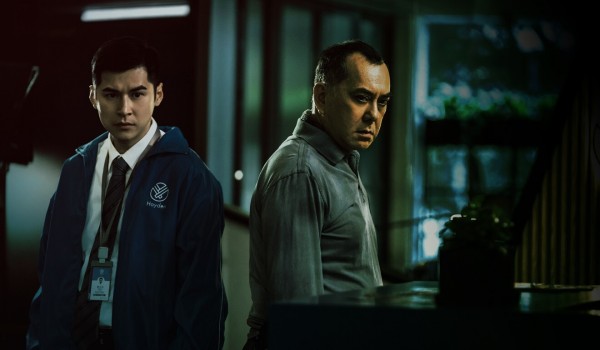
CARLOS CHAN AND ANTHONY WONG IN LEGALLY DECLARED DEAD
For the devotee, not creepy enough
This terminally grisly thriller is something you might not want to watch if you've got a big life insurance policy. To begin with, it says insurance adjusters regard every client as a crook. Next, it might give you some wrong ideas about bumping off relatives to collect, or make you think it's cool to be sadistic. I had a lot of time for the fresh-faced young Hong Kong film star Carlos Chan as insurance salesman Yip Wing-shin. But he hasn't much to do but act eager and worried. And the reason I called this movie "terminally grisly" is it's only grisly at the end. It's Based on Yusuke Kishi’s 1997’s Japanese novel The Black House, which was previously adapted into both Japanese and Korean films in 1999 and 2007 respectively. This probably isn't an improvement. These facts (but not the guess about competition) comes from an informative review for ScreenHK by Casey Chong.
Declared Legally Dead is a good example of slick, highly competent Hong Kong filmmaking without any original ideas. The scenario and direction lack the grace notes and originality to appeal to cinephiles. And there's not enough horror to appeal to genre fans, either. One thing that's impressive: the lush score by Yusuke Hatano, utilizing the Budapest Art Orchestra. Excellent musicians, beautifully recorded and remixed for the film. They had me with the introductory music.
Mr Yip's got trouble. It's not enough that life insurance seems to attract the sadistic and the larcenous. He himself gets ured into a spooky den occupied by Mr. and Mrs. Chu, an evil couple who later turn out later to owe big to a loan shark for gambling debuts. Chu Chung-lak (professional creep Anthony Wong) is persistent and scary like a zombie. Mrs Chu, aka Shum Chi-ling (Karena Lam, cast against type) has a cloudy eye and a limp. Shhh....don't tell anyone: she's the evil one, he's the doofus. They lure Mr. Yip into their creepy den to be witness of the suicide of Chu's stepson, Chu Kafu. Only Chu's eagerness to collect the insurance suggests it's not what it might appear. Later Yip is saying, "He set me up, used me as his alibi."
The insurance company delays, Mr. Chu is impatient, and Yip starts investigating. The police don't get involved, probably too busy arresting pro-democracy protesters, suggests the Today sarcastic Singapore-based reviewer, Douglas Tseng. He calls this movie a "half baked insurance scam thriller." Damn, he has all the good ideas.
As the delaying and investigating go on, we meet Yip's girlfriend, Wai-yee (Kathy Yuen) a psychology major, and her teacher, Kam Chio. He has some terrible ideas about the desirability of extreme punishment for criminals (the stuff about the cruelty of narcissistic types sounded rather familiar), and while he comes to an awful fate it seems not undeserved. On Letterboxd - where people get to the point fast - astute critic Big Chungus deplores "a regressive mindset towards mental health - where people who are sick are presented as insane, and the good guys try to diagnose them off textbook terms based on broad assumptions instead of understanding." True, and simply incinerating the person who displays this mindset isn't enough.
Going back to labels, South China Morning Post's Edmund Lee (or his editor) calls this in their review's headline "a psychological thriller with a slasher ending." But the trouble is it patently fails on both counts. What it offers is the opportunity to admire Carlos Chan in a wife beater staying up all night with his girlfriend while you're listening to the rich sounds of that Hungarian symphony orchestra. If you want a recent Asian psychological thriller, Lee Chang-dung's Burning is as good as it gets. If you want quality gore with psychological sickness as well, try Fincher's Se7en or Demme's Silence of the Lambs.
Speaking of titles, the English one, as can happen, makes little sense. The meaning of the Chinese title is "Cause of death is not suspicious," which is what the first half of the film is about.
Legally Declared Dead 死因無可疑, 109 mins., opened in Hong Kong in Dec. 2019 and in Singapore and Malaysia Aug. 20, 2020. Screened for this review as part of the NYAFF virtual 2020 edition, where it shows only in the NY State region Sept. 5.
Last edited by Chris Knipp; 09-01-2020 at 10:21 PM.
-
FORGIVEN CHILDREN 許された子どもたち (Naito Eisuke 2020)
NAITO EISUKE: FORGIVEN CHILDREN 許された子どもたち (2020)
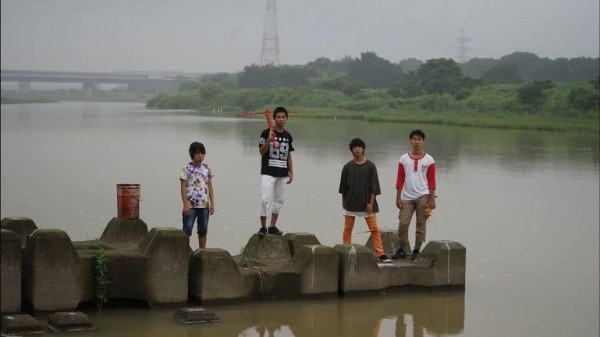
Bullies as victims: you can run but you can't hide
This second stab by Naiko Eisuke at a movie about bullying - the first was a bullied person's revenge flick, gruesome but satisfying to some tastes - has justifiably received more recognition. It gets more into the complexities, seeing the bully as victim and noting the cruel destructiveness of contemporary social media attacks. Eisuke doesn't sustain his style throughout; he seems more obsessed with his subject than with his art. But it stays lively throughout. He has performed the difficult feat of making a memorable film about a well-worn topic.
The early segment has an artful wildness. It's playful, then dead serious. It follows with nimble camera the group of four bully boys, young teenage pre-delinquents, out in a wasteland. Their leader is Kira Ichikawa (the striking Yu Uemura). Another boy, Itsuki (Takuya Abe), who is bullied, arrives with a small homemade crossbow made out of chopsticks, a flimsy thing. Only a miracle turns it into a murder weapon. Kira aims it at Gurimu (Ryuju Sumikawa), another, smaller bullied boy. Itsuki steps in front of Gurimu to protect him, and Kira shoots, catching Itsuki in the neck, and the boys run off and leave him to bleed out and die. All this has a shocking blunt vérité clarity.
Also simple, flowing, and effective is the quiet police interrogation of Kira at home, with his parents very much in evidence. The judicial trial that follows with the devastated parents of the dead Itsuki present, the whole thing seeming too flat and rapid, also feels like a reasonable simulacrum of the event. After that, where there were more choices where to go with scenes, the energy and focus dissipate.
A saving grace is Kira. He is made to seem a dark void in the center of everything, a person mysterious even to himself. He's strong at first only because he's inert. He's the exact opposite of the hyper-conscious monster (who commits a massacre with a crossbow) played by Ezra Miller in Lynne Ramsey's We Need to Talk About Kevin. Yu Uemura, whom Max Scilling in his admiring Japan Times review has compared to the bright-eyed Yuya Yagura of Koreeda's masterful Nobody Knows, holds the increasingly busy and turbulent film together. He has a kind of feral grace, seeming both pretty and damaged, with a rough look and a scar under his left eye from being bullied himself, looking alternately hurt, vulnerable, and defiant.
After the incident and the judge's decision absolving Kira, comes the hard part - which shows what a tough, demanding movie this is to watch (that's why it should be more spare and precise).The focus is on the aftermath. At first Kira is hanging around with his pals again, but then other boys come and beat him up horribly - their action polished off by Gurimu, the boy he used to bully, landing him in the hospital. Kira's father (Mihara Tetsuro) is fired from his job, and even his defiant mother gets the message.
What they need is witness protection, but that's not available. In fact, though their disappearance temporarily complicates that, Itsuki's parents are initiating a civil suit against Kira. They move somewhere else and Kira goes to a new school under a new name. He's a smoker now and a loner, followed by Momoko (Yukino Nagura), a girl from school good at making stuff. She helps him rebuild a crossbow (really?). She's an outsider too, accused of dating her adult drama teacher, participating in an illicit relationship.
We go back and forth to a discussion of bullying in Kira's class, broken up into groups to hash out the issue. This is when the idea comes up that the real victim is the bully. The bullied person is the root cause of the bullying: blame the victim. Kira is silent and hiding in multiple hoodies. But his story is all over the internet, and his classmates are all over the internet too, and one of them outs him in the bullying discussion class. All this is certainly a bit on the literal side but shows Eisuke's flair for wrangling groups of kids. After that, the screen goes media-mad for a while, and Kira's mom is lured into writing a defensive memoir that's reviled, but well-publicized in a tabloid magazine. Somehow all the media stuff doesn't overwhelm the personal side. It's hyper-active and distracted: that that's the world we live in now.
Schilling writes that Forgiven Children (the actual translation of the Japanese title, for a change) has "a legal, moral and psychological complexity" that shows "the messiness of reality," in which "storybook endings have no place." He's referring to bullying films where there's retribution, or reform.
The film meanders, but the intense, theatrical scene when Kira gets outed in the classroom is still great, both horrific and funny, with the chant of "Tweet it! Tweet it!" Kira and his parents must flee again, Itsuki's parents find them, and the father flees. Shinri, Kira's mother (Kuroiwa Yoshi) remains his unshakable ally. The screen is repeatedly filled with tweets and texts, videos, and other online media blasts - a busy, destructive cyber world where you can run but you can't hide. It's called "the Riverbed Case" - a homage to Keanu Reeves' debut, perhaps?
At the end, which goes on too long, Eisuke tries for some poetic and surreal moments and celebrates the bond between Kira and his mother, with nods to earlier coming of age classics (Clio Barnard? Shane Meadows, perhaps?) and a moment of positivity, fruit tart, and coffee, offering sweetness, smiles, and a little hope. For all his mixed messages Eisuke winds up making a solider and more humane movie this time. His persistence with this familiar theme has taken him to a new level.
Forgiven Children 許された子どもたち, 131 mins., opened in Japan Jun. 1, 2020. It was screened for this review as part of the 2020 virtual New York Asian Film Festival (Aug 28-Sept. 12).
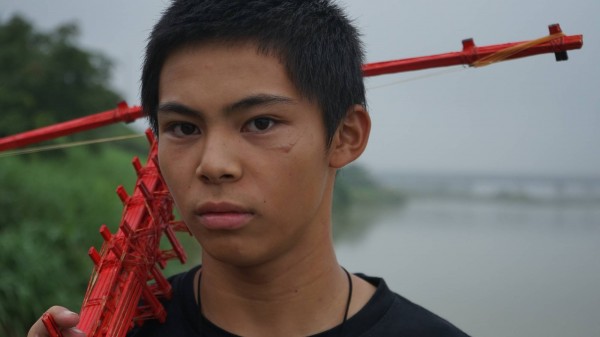
YU UEMURA IN FORGIVEN CHILDREN
Last edited by Chris Knipp; 09-02-2020 at 10:21 AM.
 Posting Permissions
Posting Permissions
- You may not post new threads
- You may not post replies
- You may not post attachments
- You may not edit your posts
-
Forum Rules





 Reply With Quote
Reply With Quote








Bookmarks